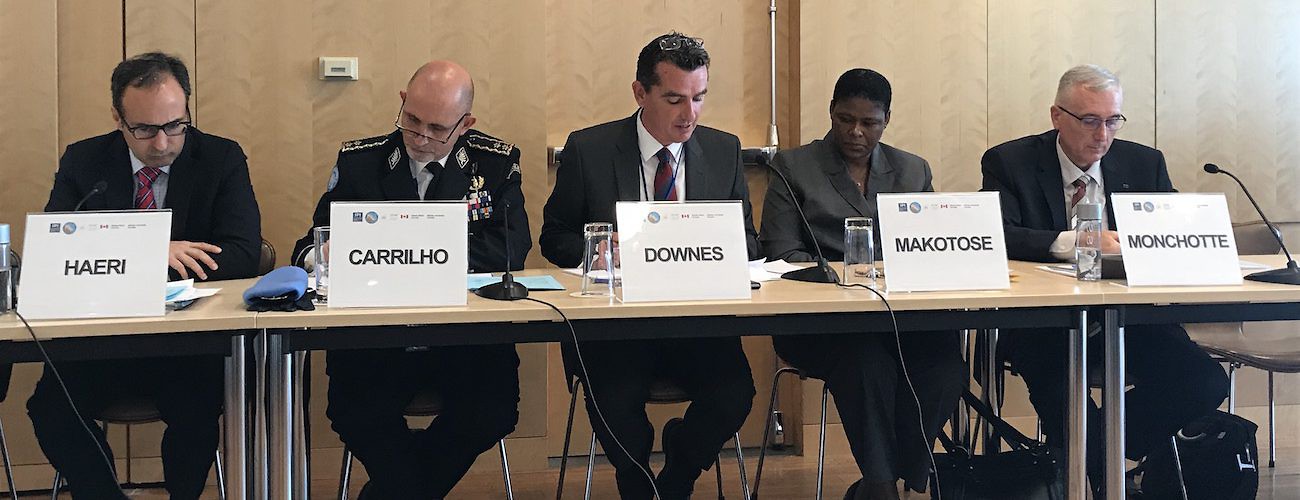On June 20th, IPI partnered with Challenges Forum and the UN Police Division to host a closed door roundtable , supported by the Geneva Centre for the Democratic Control of Armed Forces (DCAF) and Global Affairs Canada. This meeting, on the eve of the UN Chief of Police Summit, brought together police leaders, police advisers, and UN staff to discuss the changing role of police in peacekeeping operations and how police leadership can address these challenges. Participants discussed the integral role that police play in peace operations, and how this role can be further strengthened by addressing issues surrounding police leadership.
Police have an integral role in peace operations, and effective police leadership is key to missions achieving their mandate and building and sustaining peace. To further understand the challenges facing police leadership in the field, the International Peace Institute (IPI), Challenges Forum, and UN Police Division, with support from the Geneva Centre for the Democratic Control of Armed Forces (DCAF) and Global Affairs Canada, organized a closed-door roundtable on June 20, 2018, on the eve of the UN Chiefs of Police Summit. This meeting brought together police leaders, police advisers, and UN staff to discuss the changing role of police in peacekeeping operations and how police leadership can address these challenges. Key takeaways from the discussion included the following:
- To prepare for handing over responsibility to state institutions, UN police need to build the capacity of national police—a task that goes beyond training and equipping, and one that is particularly challenging when the state has little presence. UN police must put in place an exit strategy, including clear benchmarks developed with the host country to ensure national ownership. They also need to serve as a model for national police by upholding human rights and maintaining discipline.
- Resources, including skill sets, need to be increased and matched with the needs of police. Deployments are often based not on need but on supply. Police leaders need to prepare for this lack of resources by having a clear political strategy to help them target a few key priorities rather than attempting to achieve all tasks simultaneously. Police leaders also need to coordinate with other sections and agencies working on similar tasks.
- As the first point of contact with communities, police are often responsible for local perceptions of the mission. When police are able to protect civilians and support national police in community policing, they can boost the legitimacy of the mission. But challenges arise when police are unable to deliver on their mandate or are perceived not to be delivering (e.g., due to unrealistic expectations). UN police need to communicate what they are there to do and what they can and cannot do and to use force correctly.
- The roles of the military and the police are different (e.g., police are often deployed long-term to build state capacity). But oftentimes, the senior leadership team is not clear about their distinct roles and responsibilities. This can be confusing and problematic if the military or police are asked to undertake tasks not within their role. Police leaders need to strongly communicate with the senior leadership team about their roles and to coordinate with the military component to ensure coherence and complementarity.
- Gender parity among UN police is needed to increase their capacity. Female police officers are particularly important to community policing. Police-contributing countries need to be encouraged to deploy female police officers, especially in remote areas national police cannot reach.
- Scenario-based training for senior leaders (pre-deployment or in-mission) can address gaps in knowledge, familiarize leadership with policies and standard operating procedures, and enhance coordination and communication between civilian, military, and police components. IPI has been developing training scenarios to build leadership skills for civilians, police, and military. These scenarios are meant to complement existing trainings such as those implemented by the UN Departments of Peacekeeping Operations and Field Support to address challenges facing leaders in-mission, including those unique to police leadership.








